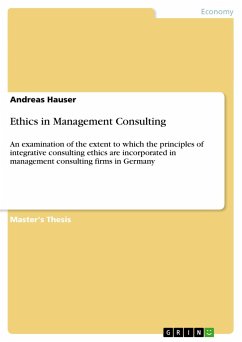Master's Thesis from the year 2009 in the subject Business economics - Business Management, Corporate Governance, grade: 1,0, University of Applied Sciences Ludwigshafen (Institute for International Management Consulting I-IMC), language: English, abstract: In the current financial and economic crisis, public concern of a value-based economic system grows. The demand by politicians, economists and the society for ethics-oriented behaviour in the market increases and thus questions the prevailing system of worldwide managerial capitalism. Especially in Germany, the rising awareness for bad business practices calls for a change in values. This development not only affects the providers of products and services, but also has significant impacts on their strategic and operational advisors: the industry of management consulting.Against this background, the present masters dissertation examines the extent to which the principles of integrative consulting ethics are incorporated in management consulting firms in Germany. To this end, the determinants of awareness, institutionalisation, application and enforcement of ethics integration in organisations are assessed. This work represents the first academic approach to researching the practical application of thoroughly reflected ethics-oriented guidelines and standards in the industry management consulting.After a general introduction into the topic, the theoretical framework research provides the background of the work done in the field of ethics in management consulting, namely integrative consulting ethics. The empirical part employs a multi-method approach: firstly, a quantitative survey was carried out via the BDU (Association of German Management Consultants) and produced a total of 194 responses, thus providing a statistical relevance for the results; and secondly, qualitative interviews were led with four representatives of large management consulting firms in Germany, leading to a series of conclusive deductions.The drawn up conclusions show that the level of incorporating the principles of integrative consulting ethics in management consulting firms in Germany is generally low. Awareness for the topic is superficial, leading to deficient institutionalisation; furthermore, application is suggested to be very weak and enforcement appears to be practically non-existent. Finally, the outlook and the recommendations act as a reference to improve the current status quo of the industry in the light of a rising importance of value-oriented activity within the economic system.








